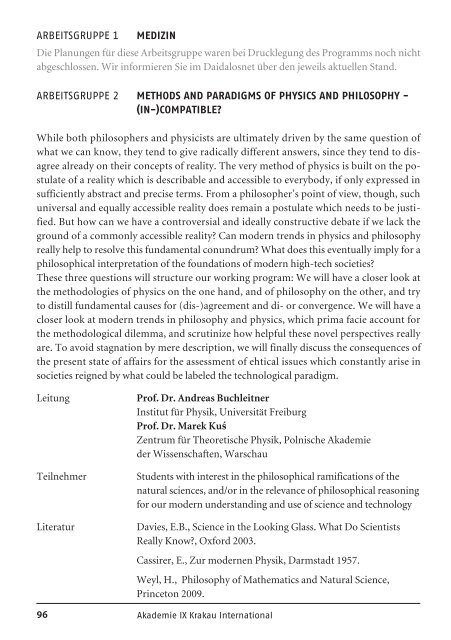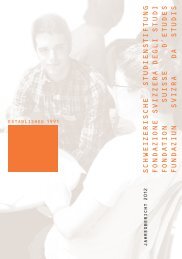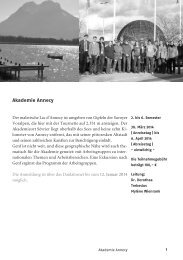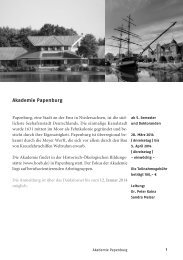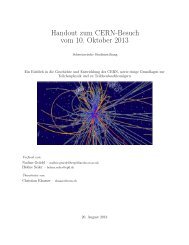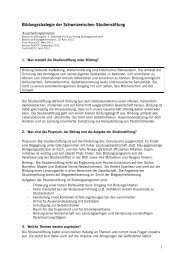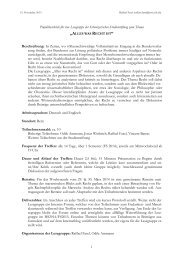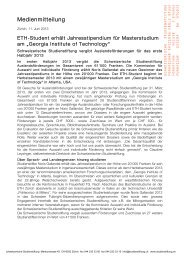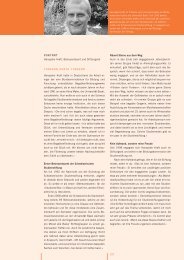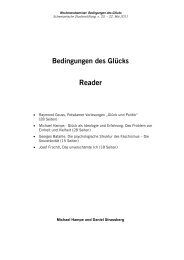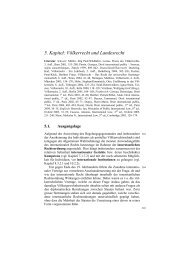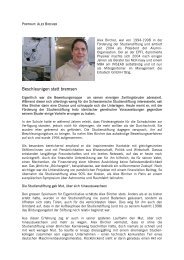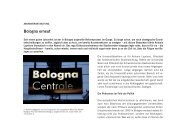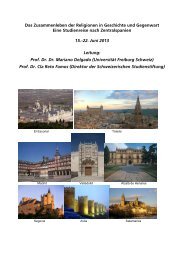Sommerakademien der deutschen Stiftung - Studienstiftung.ch
Sommerakademien der deutschen Stiftung - Studienstiftung.ch
Sommerakademien der deutschen Stiftung - Studienstiftung.ch
Sie wollen auch ein ePaper? Erhöhen Sie die Reichweite Ihrer Titel.
YUMPU macht aus Druck-PDFs automatisch weboptimierte ePaper, die Google liebt.
Arbeitsgruppe 1<br />
Medizin<br />
Die Planungen für diese Arbeitsgruppe waren bei Drucklegung des Programms no<strong>ch</strong> ni<strong>ch</strong>t<br />
abges<strong>ch</strong>lossen. Wir informieren Sie im Daidalosnet über den jeweils aktuellen Stand.<br />
Arbeitsgruppe 2 Methods and paradigms of physics and philosophy -<br />
(in-)compatible?<br />
While both philosophers and physicists are ultimately driven by the same question of<br />
what we can know, they tend to give radically different answers, since they tend to disagree<br />
already on their concepts of reality. The very method of physics is built on the postulate<br />
of a reality whi<strong>ch</strong> is describable and accessible to everybody, if only expressed in<br />
sufficiently abstract and precise terms. From a philosopher’s point of view, though, su<strong>ch</strong><br />
universal and equally accessible reality does remain a postulate whi<strong>ch</strong> needs to be justified.<br />
But how can we have a controversial and ideally constructive debate if we lack the<br />
ground of a commonly accessible reality? Can mo<strong>der</strong>n trends in physics and philosophy<br />
really help to resolve this fundamental conundrum? What does this eventually imply for a<br />
philosophical interpretation of the foundations of mo<strong>der</strong>n high-te<strong>ch</strong> societies?<br />
These three questions will structure our working program: We will have a closer look at<br />
the methodologies of physics on the one hand, and of philosophy on the other, and try<br />
to distill fundamental causes for (dis-)agreement and di- or convergence. We will have a<br />
closer look at mo<strong>der</strong>n trends in philosophy and physics, whi<strong>ch</strong> prima facie account for<br />
the methodological dilemma, and scrutinize how helpful these novel perspectives really<br />
are. To avoid stagnation by mere description, we will finally discuss the consequences of<br />
the present state of affairs for the assessment of ehtical issues whi<strong>ch</strong> constantly arise in<br />
societies reigned by what could be labeled the te<strong>ch</strong>nological paradigm.<br />
Leitung<br />
Teilnehmer<br />
Literatur<br />
96<br />
Prof. Dr. Andreas Bu<strong>ch</strong>leitner<br />
Institut für Physik, Universität Freiburg<br />
Prof. Dr. Marek Kuś<br />
Zentrum für Theoretis<strong>ch</strong>e Physik, Polnis<strong>ch</strong>e Akademie<br />
<strong>der</strong> Wissens<strong>ch</strong>aften, Wars<strong>ch</strong>au<br />
Students with interest in the philosophical ramifications of the<br />
natural sciences, and/or in the relevance of philosophical reasoning<br />
for our mo<strong>der</strong>n un<strong>der</strong>standing and use of science and te<strong>ch</strong>nology<br />
Davies, E.B., Science in the Looking Glass. What Do Scientists<br />
Really Know?, Oxford 2003.<br />
Cassirer, E., Zur mo<strong>der</strong>nen Physik, Darmstadt 1957.<br />
Weyl, H., Philosophy of Mathematics and Natural Science,<br />
Princeton 2009.<br />
Akademie IX Krakau International


